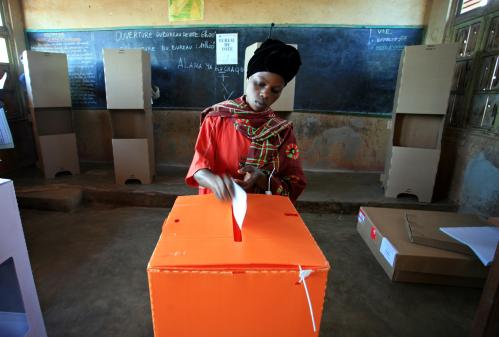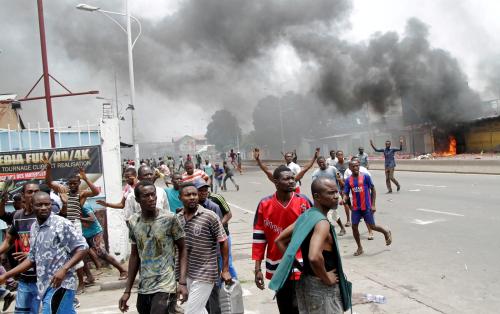This is the third in a series of three posts explaining the steps towards the current political crisis in the Democratic Republic of the Congo, examining the electoral changes and consequences, and exploring the political and democratic future of the Central African country.
The major players in the DRC presidential election—likely to be held in April 2018 given recent events—are already gearing up for what promises to be a hard-fought and ugly campaign. But who are they?
The incumbent
President Joseph Kabila of the People’s Party for Reconstruction and Democracy (Parti du peuple pour la reconstruction et la démocratie—PPRD): Constitutionally, he is no longer eligible to stand for another term in office; however, as noted earlier, this conclusion is being complicated by the ruling of the country’s highest court, which provides Kabila with the opportunity, although disputed by the opposition, to remain in power and eventually change the constitution to allow him to legally compete for another term in office. If Kabila is concerned about his legacy and wants to leave one that would be more fondly remembered than that left by his predecessors—Mobutu and Laurent Kabila—the younger Kabila should step down in December 2016 as required by the constitution and subsequently serve his country as a “senior” statesman, setting an example for future leaders and helping select his successor by promoting peaceful and fair elections. At the moment, though, this seems unlikely.
Kabila’s supporters. Despite the optimism expressed by Kabila loyalists regarding a referendum to change the constitution, successfully organizing one is not a slam-dunk. After all, in 2014, the president’s supporters were not able to garner the 60 percent super-majority in the Assemblée nationale needed to carry out a referendum. Also, in September 2015, the G7, a coalition of seven political parties, split from the government, severely weakening it. As of June 2016, following the Lake Genval conference (more below), the G7 is now part of the opposition. The split has weakened the president’s dominant position in the Assemblée nationale. Of course, Kabila’s supporters must be aware that any attempt to rush a constitution-amending bill through the Assemblée nationale could trigger more violence and exacerbate the country’s already deteriorating security situation. Although Kabila’s supporters appear to intimate that the Congolese people love their president and want him to stay in office after December 2016, the truth of the matter is that Kabila is extremely unpopular, and it is not likely that the ruling party would win a referendum to change the constitution and eliminate presidential term limits without resorting to cheating.
The opposition
Historically, the Congolese opposition has been fractured and unable to unite under a single candidate who can mount a serious and effective campaign against the incumbent.
The Congolese political situation is quite complex. There are over 400 political parties in the DRC, most of them located in the capital city of Kinshasa. Historically, the Congolese opposition has been fractured and unable to unite under a single candidate who can mount a serious and effective campaign against the incumbent. It, however, performed relatively well in the 2011 presidential election, in which opposition candidate Étienne Tshisekedi captured a respectable 32.33 percent of the votes cast. With his help, the opposition can not only successfully fight any attempts by the Kabila camp to subvert the constitution and ensure a third term for the incumbent, but can also produce a potentially winning platform for the next presidential election.
Some of the parties belong to alliances or coalitions that are part of the umbrella opposition alliance called Le Rassemblement—founded at Lake Genval (Belgium) on June 10, 2016. Important members of the Rassemblement include the UDPS (l’Union pour la Démocratie et le Progrès Social; (2) the G7, which comprises seven leading Congolese political leaders who were summarily expelled from the government after they penned an open letter to Kabila and asked him to respect the constitution and step aside when his term expires; (3) and l’Alternance pour la République (AR), which is a regrouping of 16 opposition political parties and civil society organizations, who have targeted Moïse Katumbi as a candidate for the highest office in Congo (both the G7 and AR have thrown their support to Katumbi in an effort to defend and uphold the Congolese constitution); and (4) La Dynamique de l’Opposition, which is a platform of several opposition parties.
Of course, a united opposition must not only present arguments that convince the Congolese people on why Kabila should leave office at the end of his term, but also show the citizens that they (i.e., the opposition) can deal effectively and fully with the country’s multifarious problems, most of which, like insecurity and poverty, have affected millions of people since independence. Thus, the opposition must not only be cognizant of the importance of unity and cooperation as an effective strategy to fight government tyranny but must be ready to provide citizens with a viable alternative to the failed policies of the incumbent government. It is not enough for the opposition to simply accuse the president and his associates of incompetence, impunity, lack of accountability, and the failure to improve the security situation in the country, as well as, advance economic growth and development. The opposition must offer the people with a viable basket of policies that can provide them with opportunities for self-actualization. Opposition elites must convince Congolese citizens that they offer a better and much more effective approach to peaceful coexistence, economic growth, and human development.
Étienne Tshisekedi of the Union for Democracy and Social Progress (Union pour la démocratie et le progrès social—UDPS): A major player, as mentioned above, in the presidential election is Étienne Tshisekedi, who has been in opposition politics for many years, having worked against the policies of Mobutu and the two Kabilas. At 83 years old and with a lot of health problems—he looks frail and does not seem to have the commanding public presence that he once had, especially during the Mobutu years—some members of the opposition believe that Tshisekedi does not have the strength and stamina to lead the struggle against the Kabila hegemony. Yet, since his return to the DRC from Belgium, where he was receiving medical care, he has already significantly energized the opposition.
During more than two years of anti-Kabila demonstrations in Kinshasa, the opposition had managed to attract only a few thousand followers. However, in early August 2016, when Tshisekedi arrived Kinshasa, large crowds of supporters lined the streets to welcome him and listen to him speak. In fact, his return has had a significantly transforming effect on politics in the country, especially in Kinshasa, as the government seems to have begun a retreat from the use of violence to crack down on dissent. Perhaps more important is the work that Tshisekedi has done to unite the opposition and increase levels of cooperation among opposition parties and organizations.
Some Congolese believe that Tshisekedi, more than any other member of the opposition, has the political experience and, indeed, the leadership skills, to unite the whole country behind policies that would transform national institutions and set the country on the right path to economic growth and development. The hope for many is that Tshisekedi will first unite the opposition and then, the country. Tshisekedi was chosen to serve as the president of the alliance Le Rassemblement, now the main opposition group in the DRC.
Moïse Katumbi: Another major principal in the DRC’s political sphere is Moïse Katumbi, a Lubumbashi (Katanga) native, considered by many to be the main challenger to Kabila’s hegemony and one of the most viable candidates running to replace the incumbent president. However, Katumbi’s candidacy has been placed in jeopardy by criminal charges brought against him by the government. Katumbi was charged with selling a house he did not own, as well as with hiring foreign mercenaries to destabilize the Congolese state. Katumbi has consistently denied all the charges against him but, while abroad to receive medical treatment, he was convicted in absentia and sentenced to three years in prison. Critics of the regime have argued that the timing of the arrest of Katumbi is significant—it signals the belief by Kabila and his aides that, if allowed to compete, Katumbi could emerge as a major constraint to the president’s ability to garner another term in office. Of course, Katumbi is not an outsider—he served as governor of resource-rich Katanga for eight years under Joseph Kabila. Nevertheless, he left the ruling coalition arguing that Kabila had not been loyal to the constitution and instead had engaged in policies that subverted the rule of law. As noted above, he is supported by the AR and G7.
Katumbi has called on the international community to impose sanctions on Kabila and his associates, including security officials who are said to have been responsible for the killing of many citizens protesting against Kabila, his policies, and the possibility that he might try to change the constitution to eliminate the two five-year term limit for the presidency. Katumbi argued that without international sanctions, the government will continue to kill Congolese people. It seems the international community is listening to him: In early October 2016, the U.S. government imposed sanctions on two senior Kabila officials—Major Gen. Gabriel Amisi Kumba and John Numbi (a former senior police official) in response to the election postponement.
Vital Kamerhe of the Union pour la nation congolaise: Kamerhe, while an important figure, is a more minor player in the DRC, managing to garner only 7.74 percent in the DRC presidential election of 2011 (in comparison to Kabila’s 48.95 percent and Tshisekedi’s 32.33 percent; of course, Tshisekedi argues that the election was marred by fraud orchestrated by the government). Kamerhe is a former speaker of the Assemblée Nationale, as well as a former minister of information. Although Kamerhe is part of the opposition alliance called the Rally (Rassemblement), he and Ève Bazaiba of the Mouvement de libération du Congo (MLC) did not attend the Lake Genval conference and have both voiced concern that the increasing cooperation between Katumbi and Tshisekedi could marginalize them.
What do we think would happen?
The election has already been postponed. The question is: What will happen come midnight, December 19, 2016? If Kabila follows the ruling of the Cour constitutionnelle and stays in office, the country is likely to be plunged into the type of violence that could lead to civil war. Of course, the opposition has an important role to play in resolving this political quagmire and making certain that, should Kabila remain in office after December 2016, the country is not plunged into war. But, what can and must the opposition do? The opposition must instruct its members to remain calm and use only legal and peaceful means to oust a Kabila-led government and undertake fair, peaceful and credible elections to form a new, permanent government. They might have a long way to go until 2018.
The Brookings Institution is committed to quality, independence, and impact.
We are supported by a diverse array of funders. In line with our values and policies, each Brookings publication represents the sole views of its author(s).







Commentary
The postponed DRC elections: The major players for 2018
December 2, 2016